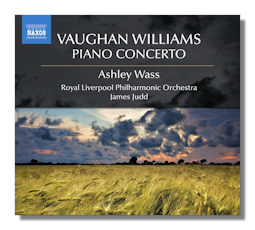
The Internet's Premier Classical Music Source
Related Links
- Vaughan Williams Reviews
- Latest Reviews
- More Reviews
-
By Composer
-
Collections
DVD & Blu-ray
Books
Concert Reviews
Articles/Interviews
Software
Audio
Search Amazon
Recommended Links
Site News
 CD Review
CD Review
Ralph Vaughan Williams

- Piano Concerto *
- The Wasps
- English Folksong Suite
- The Running Set
* Ashley Wass, piano
Royal Liverpool Philharmonic Orchestra/James Judd
Naxos 8.572304
The Piano Concerto dates to the period 1926-30, and was premièred in 1933 by Harriet Cohen, with Sir Adrian Boult conducting the BBC Symphony Orchestra. The work was not a success then, and Vaughan Williams, at the suggestion of Boult, arranged a 2-piano version, because, the story goes, the orchestration is so powerful, a single piano has trouble holding its own against such overwhelming forces. One finds that reason rather curious, as there are numerous concertos of equal or greater orchestrational heft (the Brahms 2nd, the Prokofiev 2nd, to name but two). In any event, I first became familiar with the concerto in its 2-piano version from a 1968 EMI recording by pianists Vitya Vronsky and Victor Babin. I never really cared for the concerto in that version, but the original here makes me reconsider the music's artistic worth, and believe me, the original is the superior rendition.
The opening Toccata is blustery and energetic and is typical Vaughan Williams in its themes, orchestration and contrasting moods. But in a few places the piano writing isn't particularly interesting: you can tell Vaughan Williams was not a pianist, as the soloist is often repeating chords or runs or some rhythmic motif in the background – providing filler, in effect – while the orchestra is presenting much more vital and engrossing music. The second movement (Romanza: Lento), is somewhat more interesting pianistically: the soloist presents the main theme amid its own swirls and dark mists, before the flute takes up the melody more sweetly. The rest of the movement remains subdued and languishes in a lovely haze for the most part, emerging, however, into the daylight for the lush, somewhat glorious middle section.
The finale, marked Fuga chromatica, con finale alla tedesca, is filled with variety and shifting moods and in many ways is the hardest movement to bring off. Ashley Wass is fully convincing here and in the other two movements, and James Judd leads the Royal Liverpool Philharmonic Orchestra with an incisive hand. The sonics, as in the other works here, are excellent. Is this a great concerto? Probably not, but it is worthwhile Vaughan Williams and shouldn't be missed by his fans.
Ditto for the leadoff piece here, The Wasps. It begins with the deservedly well known Overture, but the other four numbers are all delightful and fully worth your attention as well. The second section, Entr'acte, for instance, has an almost Tchaikovskian character in its magical orchestration and bright colors. Yet, it sounds like vintage Vaughan Williams. The third number, The March Past the Kitchen Utensils, is humorous and chipper, again with masterly orchestration.
The English Folk Song Suite is a fine bonus offering. Played in an arrangement by Gordon Jacob (it was originally scored for military band), the music is folk-inspired and chipper, and again brilliantly played. The six-minute Running Set is an energetic take on a dance. Neither profound nor pretentious, the music is folk-inspired and quite infectious. It features themes that stay in the mind long after hearing and has such vitality and color as to make you wonder why this piece is not heard more often. All in all, a fine disc. Highly recommended.
Copyright © 2010, Robert Cummings




















